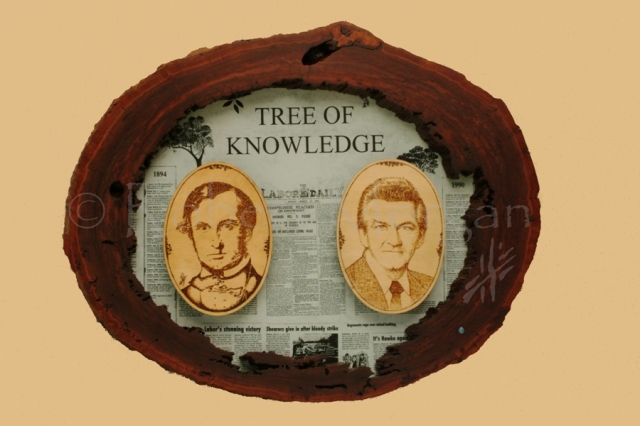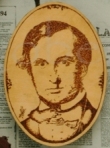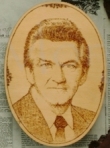The SANDS OF TIME Collection – 11. Tree Of Knowledge
11. Tree Of Knowledge
Darcy Wentworth & Robert James Lee Hawke — 870 x 710 mm
© Robert Morgan

D’ARCY WENTWORTH (ca. 1762-1827)
Surgeon
 D’Arcy Wentworth, the son of an impoverished but well-connected family, was born in 1762, near Portadown, Ireland. While still in his teens D’Arcy Wentworth joined the First Armagh Company of the Irish Volunteers. It was here that he was apprenticed to Dr Alexander Patton. He subsequently went to London to complete his medical studies.
D’Arcy Wentworth, the son of an impoverished but well-connected family, was born in 1762, near Portadown, Ireland. While still in his teens D’Arcy Wentworth joined the First Armagh Company of the Irish Volunteers. It was here that he was apprenticed to Dr Alexander Patton. He subsequently went to London to complete his medical studies.
In 1787 Wentworth was thrice charged with highway robbery and thrice acquitted. He was again charged with highway robbery in 1789. After being acquitted again he sailed to Sydney Town to take up an appointment as assistant surgeon. Upon his arrival in the colony Wentworth took up a post at Norfolk Island. In 1791 he was appointed superintendent of convicts and 1796 he returned to Sydney where he was appointed assistant surgeon. In 1809 he was appointed the Civil Medical Department’s principal surgeon.
In Sydney Wentworth took on the responsibilities of a prominent citizen. He was treasurer of the Police Fund, was involved in the establishment of the Bank of New South Wales, was Governor Macquarie’s personal surgeon, and was an early commissioner of the Parramatta turnpike road. Wentworth became one of the colony’s wealthiest citizens largely due to his building the ‘Rum’ Hospital and gaining permission to import 65 000 gallons of rum per year.
When he died at Homebush, Sydney, on 7 July 1827 Wentworth owned over 20 000 acres and was widely regarded as the richest man in the colony. Obituaries at the time declared him to be humane, liberal, compassionate and ‘a lover of freedom’.
◊
 Robert (Bob) Hawke was born in Bordertown, South Australia on 9 December 1929. Hawke was educated Perth Modern School and the University of Western Australia where he graduated BA LLB in 1951. In 1852 he won a Rhodes Scholarship to Oxford University where he successfully completed a B Litt. Upon his return to Australia he worked in research at the Australian National University from 1956 until he took up a position as an advocate for the ACTU in 1958.
Robert (Bob) Hawke was born in Bordertown, South Australia on 9 December 1929. Hawke was educated Perth Modern School and the University of Western Australia where he graduated BA LLB in 1951. In 1852 he won a Rhodes Scholarship to Oxford University where he successfully completed a B Litt. Upon his return to Australia he worked in research at the Australian National University from 1956 until he took up a position as an advocate for the ACTU in 1958.
Hawke gave notice of his political aspirations in 1963 when he unsuccessfully stood for the Victorian Federal seat of Corio. He became an important public figure in 1970 when he was elected president of the ACTU. In the next decade he established himself as a power broker and media figure. He was projected as a great conciliator in labour disputes and he received wide publicity when the trade union movement purchased petrol stations and discount shops.
From 1973 to 1978 he was national president of the Australian Labor Party. He moved into the Federal political arena when he won the Victorian seat of Wills at the 1980 elections. Hawke’s rise through the party ranks was very rapid. He challenged W. G. Hayden for the party leadership in 1982 and lost. The following year, only hours before an election was called, he announced his leadership aspirations after Hayden had resigned. In February 1983 he led the Australian Labor Party to a convincing victory and he won office again in December 1984. In July 1987 the Hawke Government was re-elected for record third term. Hawke is Australia’s twenty-eighth Prime Minister.
◊
